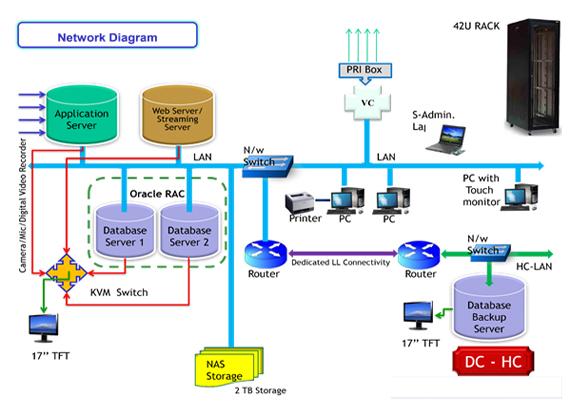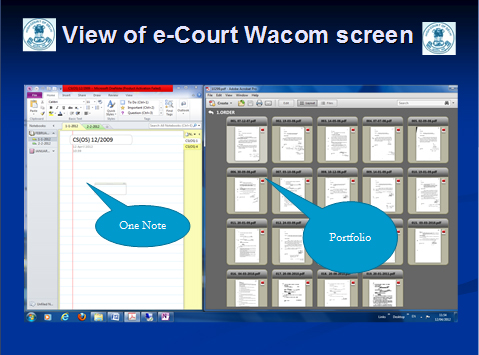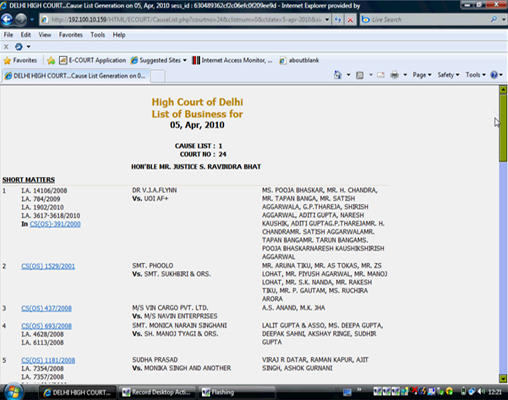E Courts Software Development Company USA
ICT in Courts, An Introduction
An independent, effective, and efficient judicial system that fosters respect for the rule of law is indispensable in all the Courts of the world. Modernization, streamlining and improved efficiency of the court systems are paramount in order to ensure a high degree of protection of individual rights and therefore increase citizens' faith and confidence in the State. We at proud technologies provides a complete one stop solution for e courts, filing, ecourt's and digitization of courts records at large.
We at proud technologies are proud to honour that we are already giving services to the Judicial bodies in India and have a good Connecting platform and knowledgebase for implementing this application in Federal High Courts of Nigeria. we are still under process of execution few projects in Official liquidator and PMLA courts.
People or common man often have a stereo-typed view about Courts being slow, rigid and secretive. Information & Communication Technology can help team of Proud Technologies to change this impression and Courts can became more efficient, fast, responsible
and user friendly for common man as well as for judges and Lawyers. It is beneficial for all the stake holders in the Courts like:
Judges Litigants Lawyers
Court Staff General Public Government
In order to bring about reforms in judiciary to remove the archaic procedures and outmoded administrative and management system, technological, communication and management related changes are to be brought about. Computerization of judiciary is one of the important ingredients of judicial reforms.Technological Developments in the field of information and introduction of computers have made a turning point in the history of human civilization. It has brought about a sea change in all fields of human activity.
It has resulted in enhance deficiency, productivity and quality of output in every walk of life. The information technology is advocated in the western countries for the last two or three decades, but hardly any worthwhile effort has been made till recently, particularly, in judicial administration of courts in developing countries and in Almost Africa Continent. There is an immediate need for exposing legal profession, judicial fraternity and court management to the updated computerized technology so as to render speedy justice with better legal outputs.
Extensive use of Information Technology by diverse organizations the world over has resulted in enhanced efficiency, effectiveness and optimal use of resources. Computers as well as electronic communication devices such as facsimile machines, electronic mail, video conferencing, provide the ability to process large volumes of data with speed and accuracy, exchange of useful information between different locations and support higher quality of decision making. These capabilities have contributed to more efficient and responsive systems not only in business organizations, but also in legal, governmental and other public systems. While the Information Revolution arrived in Africa some years ago, automation has not transformed all facets of life in equal measure. It has not permeated to the judiciary in particular, resulting in old work methods based on manual systems being continued even now. The enormous problems being faced by the judiciary due to arrears, backlog and delays can be partly resolved by the introduction of automation in courts.
We have to keep in mind that we cannot follow the developed countries blindly without realizing the ground realities. We do not have sufficient funds to go for large-scale computerization of courts. Therefore, we have to be realistic and proceed in a phased manner. Optimal utilization of funds is required in this field as the justice delivery system is answerable to the public at large.
The main components of computerization consist of procurement of hardware, choice of operating system and development of software. All of them are highly capital intensive and care has to be taken while making well informed choices.
Our Understanding on Courts and its Systematic Functionality
It is always important for any organization who is willing to work on a project of E-filing, courts and CIMS, to have a real taste of what actually is present at ground zero and what is expected from it. To achieve this we had a visit to the Specific premises/courts to provide a perfect solution.
Website and Master portal for E-filing and ECIMS Modules are as under ,
- Online Case filing
- General Court information
- Cause lists
- Roster
- Display Board
- Court fees online
- Case status
- Orders
- Judgments in PDF
- Online forms for application for urgent listing, inspection, process fee etc.
- Certified copies information
- Web casts (not necessarily but recommended, for greater transparency of court hearing)
- Live streaming of court cases
- Archived court cases
- Court functions
- Swearing in of Judges
- Full court references
- Bare Acts
- Bar Associations
- Articles by Judges
- Practice Directions
- Links to website of other Courts as well as other Government Departments
- Tenders and Bids
- Statistics
E Courts highlights At A Glance
- Touchscreen Panel with Digital Pen to be provided to the Judges
- Its Control will be with the Judges as well as with Court Registrars
- E-File records, evidences and other case related documents (depositions, notes, files, summons and orders) are scanned and digitized via scanners and visualizers and are available to authorized users for viewing.
- Allows Judges to make notes through specialized software.
- Uploading of scanned files/evidence and adding relevant metadata.
- The entire proceedings are video graphed using multiple high resolution PTZ cameras.
- The control of recording software interface is in the hands of the judge who can start/stop it anytime.
- Allows judges to see recording of proceedings for review.
- Makes the knowledge and information content available in 24x7 online environment to authorized viewers.
- Appropriate searching of case records.
- Provision to provide authentic case copies to authorized persons.
- Provision to upload the case records to a central archive.
- Live webcast of case proceedings with password protection.
Some of the core objectives of the E-Court Project are:
- To make whole judicial system ICT enabled by putting in place adequate and modern hardware and connectivity;
- Automation of workflow management in all courts, electronic movement of records from trial to appeal courts;
- Installation of video conferencing (VC) facility and recording of witness through Video Conferencing;
- connecting all courts in the country to the National Judicial Data Grid (NJDG) through WAN and additional redundant connectivity;
- Citizen-centric facilities such as electronic filing, e-payment and use of mobile applications in all courts; touch screen based kiosks in each court complex, full computerization of State and district level judicial and service academies and centers.
- The Projects aims at computerization of all the courts and full Installation and use of Video Conferencing facility at all Court Complexes and prisons;
E- Courts Architect and network diagram is as under


Benefits of E-courts in Courts
- Reduces the paper work. Ease of record maintenance.
- Allows the judges to see E-files at any point of time.
- Appellate Court need not summon the original files.
- Used as a backup by concerned persons who are concerned about the authenticity of the documents?
- Different courts will be able to share the information online.
- Playback live proceedings for court audience.
- Use of digital signature & encryption for integrity of documents.
- Tool for Education & Training of judicial officers and courtroom personnel.
- Doctors need not cancel appointments for critical/emergency patients to attend court.
- Court,Hospitals,FSL,central Jail can simultaneously share their presentations/documents and other information online in a secured mode.
- Remote parties can depose through Video Conferencing facility using ISDN and Broadband links in e-Court.
- The documents of high secrecy which cannot be moved out of the department but needs to be shared with other agencies can be directly presented and relied upon.
- The witnesses need not be physically present in front of the accused thereby providing for their physical security.
- Experts can depose and give expert opinion in much more relaxed and conducive environment.
- Travel and other related costs will be saved.



